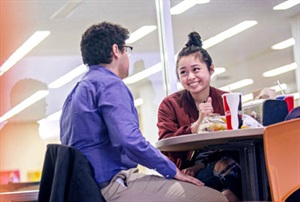Transitioning Funderburg into digital age calls for more technology, flexible function
Mention Funderburg Library to decades of Manchester graduates and they’ll likely recall stacks of books and periodicals, cramped study carrels and uncomfortable chairs. No food or beverages allowed and, above all, be QUIET!
Many alumni might not recognize how students use Funderburg today, says Darla Haines, interim library director, who has helped drive its transition into the digital age.
“We’re trying to really think about what students do here, what problems they run into and what we can bring into the library to solve those problems on the spot rather than having to send them around to different places on campus,” Haines says about the library’s updated learning hub function.
Digital resources have replaced many of the printed books, magazines, newspapers and audio recordings that used to consume much of Funderburg’s space. That digital dividend has opened areas for students to learn in a wider variety of ways, says Haines.
Individual study is still important, but today’s college students are more likely than students of the past to collaborate on problem solving and work in teams. In the digital age, multimedia presentations may be as important to a student’s course success as the traditional term paper. That kind of work not only requires functional spaces, but technology such as computers, projectors and recording equipment.
“Libraries have a history of embracing new technologies and making them available on a lot of campuses,” says Haines, who joined MU’s library staff in 1998.
The identity of librarians has changed, too. “We’ve gone from being guardians of information to being access providers. We want people to use the materials and get the most out of them and find what is best for their needs,” says Haines. “In the past, librarians curated, preserved and provided content. Now, we’ve become educators, showing students how to find what they need, evaluate it and use it appropriately."
Funderburg already has undergone changes since it was built in 1966.
The Bigler Terrace, added to the library’s east side, has tables and chairs for outdoor dining and meeting up with friends, as well as a ringside seat for watching touch football and Frisbee on the mall.
 The 24-hour study room that students once called the fishbowl was absorbed into the eatery Wilbur’s, which now includes two dining options: Twelve, offering 24/7 food and beverage choices, and CRU5H, a popular spot for casual lunches and dinners. Restrooms are now accessible 24/7, too.
The 24-hour study room that students once called the fishbowl was absorbed into the eatery Wilbur’s, which now includes two dining options: Twelve, offering 24/7 food and beverage choices, and CRU5H, a popular spot for casual lunches and dinners. Restrooms are now accessible 24/7, too.
The Walker Active Learning Classroom, opened in 2018, is a technology-rich space that encourages group learning and features teleconferencing, webcams, dual-projection screens, smart pens, large whiteboards, movable furniture and much more.
The library also has added comfortable seating such as beanbags and sofas that give study areas a homier feel. Students who don’t own laptops can check them out of the library or use the Funderburg computer lab.
While Funderburg has made significant strides, there is room for improvement, says Haines.
She envisions an “information commons” within the library, including “stations with a computer and a big screen and a table that a number of people can sit around and work on a project together.”
“Funderburg should have plenty of open, flexible spaces that provide technology and movable furniture so that students can be in control of the space and do with it what best facilitates their learning,” Haines adds.
Ideally, some student services such as writing support and, perhaps, IT support could be available in Funderburg’s future as well.
Haines also would like a dedicated space for the library’s virtual reality equipment and 3D printer so that faculty and students alike can take better advantage of the educational benefits of these newer technologies.
Moreover, Haines hopes that MU will add square footage for the Archives, including additional display space for some of the “amazing items” in the University’s collections relating to Martin Luther King Jr., Dan West, Roy Plunkett and other aspects of Manchester history.
Ultimately, whatever students need to succeed academically and prepare for life and careers would be good for Funderburg. “I want the library to be for students,” says Haines.
One of those students is junior Laura Ullom-Minnich, who not only studies regularly in Funderburg but also works at the front desk. “The Walker Classroom is a good space for group work,” she says. “Everyone can spread out and you don’t feel like you’re bothering other people.”
An environmental studies major from Moundridge, Kan., Laura is a regular on the Dean’s List and finds a sense of community in the library that encourages her to focus on her academics. “I feel motivated by the environment and by the other students studying.”